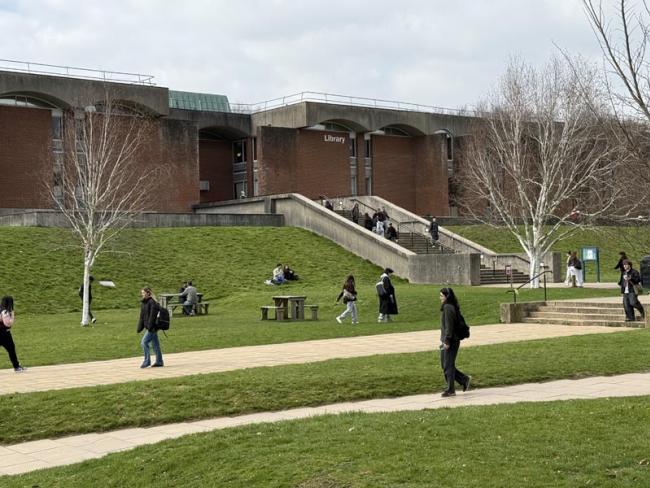
Sussex University, one of the universities deepest in debt. Photo Workers.
Many of Britain’s universities are sliding deeper and deeper into debt. Yet, instead of looking for solid foundations, they are calling for yet more dependence on the volatile global market for international students…
As the new university term begins, over 40 per cent of Britain’s higher education institutions are in deficit, according to analysis by the National Centre for Universities & Business. Closures may soon follow.
Across the sector there is a growing worry about what is called a “disorderly exit”. That’s a euphemism for the total financial collapse of a university. This would have a devastating effect on the students mid-way through their studies – as well as ending vital economic partnerships.
For years Workers has highlighted the risk of reliance on international students as a major source of income for the sector – as in an article from 2020: ”A sustainable future for higher education”.
‘Unhealthy’
In 2023 the House of Lords agreed with us. A report pointed out that “many higher education providers have developed an unhealthy and unsustainable reliance on fees from international students.”
The report noted that the Office for Students, which regulates the higher education sector, is not trusted by students or universities. Both groups called on the government to put in place a stable, long-term funding model for the higher education sector; this was ignored.
A year later the employers’ umbrella organisation, Universities UK, managed to produce its own report on the future of universities. It also asked for the government to review the higher education funding model.
But Universities UK avoids any discussion of the “unhealthy reliance” on fees from international students. On the contrary it continues to argue in favour of globalisation, claiming benefits from “hosting international students; and delivering transnational education”. It called on the government to develop a global strategy for universities and criticised the plan to charge a levy on international students.
Westminster politicians of all stripes still boast of our “great universities”, and it is true that many British academic institutions continue to be important seats of learning. Innovative ideas are generated by university staff and students and Nobel prizes are still awarded to UK academics.
Negligence
But government negligence in addressing the damage caused by their funding model is now plain for all to see. The risk of harm to students and university staff is growing by the day. This harm will radiate across communities: in many towns and cities the university is among the largest employers. Many universities are linked to other employers in the area. This is a symptom of the decline of large industrial employers.
‘Universities UK continues to argue in favour of globalisation…’
Over the past year the University and College Union has been monitoring the job losses already declared across British universities. UCU general secretary Jo Grady announced on 14 October that over 65,000 UCU members will be balloted to take strike action in a fight to protect jobs, wages and working conditions.
Grady said, “Over 15,000 jobs up for the chop. Meanwhile, staff who remain are being told to accept a huge real terms pay cut as they see their teaching and student learning conditions degraded. Our members have no choice but to vote yes for strike action and fight to protect higher education.”
The ballot opened on Monday 20 October and will run until Friday 28 November. It will be aggregated across 138 institutions meaning a successful result would pave the way for strike action at all 138 campuses in the New Year.
Shrinking
University employers have established a Transformation and Efficiency Taskforce to encourage universities to collaborate more closely “to achieve greater efficiency”. What is happening at the Universities of Kent and Greenwich (see Box) may be an indication of how the employers intend to shrink and cripple the higher education sector.
The Kent/Greenwich hook-up will be a “super university” built on sand. Other unstable couplings may follow. University staff need to demand a funding model built on solid foundations, not on speculation in volatile and declining international markets.
Existential threat
The existential threat to the sector demands that UCU refocus on issues relating to their jobs and conditions here in Britain. This will be a challenge for some branches who have preferred to focus on international issues or matters of gender identity.
A good sign is that the choice of slogan for this autumn campaign is “We are the university.” This acknowledges that the only people who can change the direction of British universities are the staff who work there in conjunction with their students.
• Related article: ‘Super university’ – or not?
